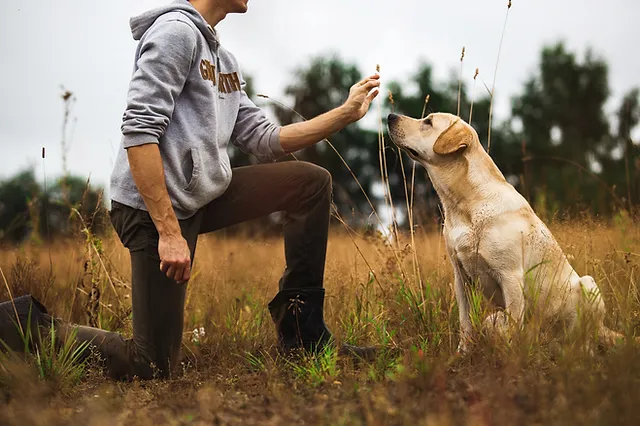
An obedient dog responds well to commands, is easier to manage, and is less likely to have undesirable behaviors like excessive barking or chewing. Believe it or not, every aspect of your dog’s care shapes their behavior, from training techniques to proper nutrition.
Understanding the underlying principles of raising an obedient dog is the first step in raising a well-behaved and happy pet. With the tips we’ve discussed, you are well-prepared to help your dog become the best pup it can be!
With that in mind, let’s look at some tips to raise an obedient dog.
Start Early with Consistent Training
Starting early and keeping up with regular training makes a big difference when you want a well-behaved dog. Begin training when your dog is a puppy. This helps them learn good behaviours before bad habits form. Puppies can quickly learn new things and are usually eager to do so, which makes early training more effective.
Always be consistent with your commands, expectations, and rewards. This will help your dog understand what you want from them. Consistency reinforces good behaviour and prevents confusion that could lead to bad actions.
Positive Reinforcement
Positive reinforcement is a popular training method that encourages dogs to repeat good behaviours by linking them with positive outcomes. It works on the principle that actions followed by rewards are more likely to be remembered and repeated.
Use food, toys, and treats from a pet store as potential rewards. When you consistently reward your dog for things like sitting on command, coming when called, or walking calmly on a leash, they quickly learn that these actions lead to something enjoyable. The timing of the reward is crucial for this method to work.
Your dog needs to be rewarded immediately after performing the behavior so that it associates the reward with the behavior. Dogs trained this way are usually more eager and willing to join training sessions. They see training as a positive experience instead of a negative one.
Establish Clear Commands
When you give clear commands, your dog understands what you want them to do. Words like “sit,” “stay,” “come,” and “down” are easy for your dog to recognize. Always use the same word for each command. For instance, if you use “down” to mean lying down, don’t switch between “down” and “lie down.”
Being clear and consistent helps your dog link the word with the action. Make sure everyone interacting with the dog uses the same commands. Otherwise, you can confuse your dog and make training less effective.
Be Patient
Dogs learn at their speed. Some dogs understand commands quickly, while others need more time. Puppies, for example, have shorter attention spans, and some breeds can be more stubborn or independent. Stay calm if your dog doesn’t follow a command immediately or makes a mistake.
Getting frustrated or yelling can make training seem negative, and you don’t want that! When your dog messes up, use gentle corrections and help them learn the right behavior.
Socialize Your Dog Early
Early socialization helps your dog get used to different sights, sounds, and situations, which can prevent irrational fears from developing. For example, exposing your puppy to car rides, loud noises, and various surfaces can make it more confident and less likely to be startled by new things. Dogs not properly socialized may develop fear-based aggression.
Incorporate Daily Exercise
A tired dog is likelier to be calm and listen well, but daily exercise is crucial for many reasons. It’s vital for your dog’s health. Regular exercise can prevent behavioural problems, keep your dog fit and mentally sharp, and build a strong bond between you two. It’s also a wonderful way to have fun together. Walking, running, or playing fetch help cement your connection with your dog.
Nutrition’s Roll in Obedience
Feeding your dog well-balanced food will give them energy for training. The right quality, nutritious food supports your dog’s health, including brain function, which is key to learning and obedience.
Setting a regular feeding schedule is part of establishing a routine, which is important for obedience training. Proper feeding habits, like ensuring your dog eats calmly, can prevent food aggression. If not addressed immediately, food aggression can hurt obedience and lead to serious behaviour problems.
